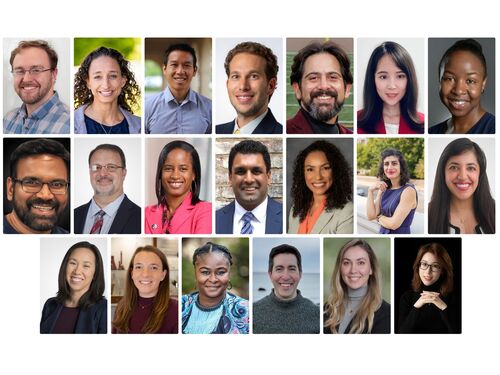Eight Winners Selected for the TRB Airport Cooperative Research Program Graduate Research Awards
News Release
By Josh Blatt
Last update December 9, 2022
WASHINGTON — The Transportation Research Board’s Airport Cooperative Research Program (ACRP) has announced the winners of its annual Graduate Research Awards. The prestigious awards focus on applied research on airport and related aviation system issues to help the public sector continue to improve the quality, reliability, safety, and security of the U.S. civil aviation system.
ACRP Graduate Research Awards aim to stimulate thought, discussion, and research by those who will become part of the future airport industry workforce. Now in its 16th year, the program is sponsored by the Federal Aviation Administration and administered by the TRB, part of the National Academies of Sciences, Engineering, and Medicine. The annual award competition is managed by the Virginia Space Grant Consortium based in Hampton, Virginia. This year’s eight graduate student awardees represent seven universities from across the U.S. Their research focuses on a wide variety of topics including pavements, foreign object debris detection, and parking revenues.
The ACRP Graduate Research Award offers a $12,000 stipend as well as the opportunity for the student’s final research paper to be published in TRB’s peer-reviewed journal, Transportation Research Record, and to present their work at TRB’s Annual Meeting, to be held in Washington, D.C., in January 2024. Awardees are also assigned a panel of experts to advise them throughout their research.
The 2022–2023 recipients of the ACRP Graduate Research Awards are:
Saed Aker is a doctoral student at Arizona State University majoring in civil, environmental, and sustainable engineering. His paper is titled “Design and Material Aspects of Sustainable Cold Recycling Technology for Airport Pavement Rehabilitation Practices.” Hasan Ozer is his faculty mentor.
Arafat Alam is a doctoral student at the University of Nebraska-Lincoln majoring in civil engineering. His paper is titled “Experimental and Numerical Study of Multi-layer Cellular Concrete for EMAS Application.” Jiong Hu is his faculty mentor.
Ryan Case is a doctoral student at Purdue University majoring in aviation technology and management. His paper is titled “Geographic Information System (GIS) Application to Unmanned Aircraft Systems (UAS) Data Mapping.” Joseph P. Hupy is his faculty mentor.
Xiao Chen is a doctoral student at Rutgers, The State University of New Jersey, majoring in civil and environmental engineering. His paper is titled “Impact of Sea Level Rise on Airfield Pavement Performance in Coastal Areas.” Hao Wang is his faculty mentor.
Mark Jackson is a doctoral student at the University of Cincinnati majoring in electrical engineering. His paper is titled “Arrayed Thermoelectric Sensors for Detection of Runway Surface Conditions.” Je-Hyeong Bahk is his faculty mentor.
Xiaofan Liang is a doctoral student at the Georgia Institute of Technology majoring in city and regional planning. Her paper is titled “Toward an Inclusive Aerotropolis: Critical Connectivity Analysis Around Atlanta Airport.” Perry Yang is her faculty mentor.
Mohammad Noroozi is a doctoral student at the University of South Florida majoring in industrial engineering. His paper is titled “Development of a Novel Foreign Object Debris Detection Framework Using Unmanned Aerial System and Computer Vision Algorithms.” Ankit Shah is his faculty mentor.
Sen Wang is a doctoral student at Purdue University majoring in aviation technology. His paper is titled “Determinants of Airport Parking Revenues: An Econometric Analysis.” Yi Gao is his faculty mentor.
The Airport Cooperative Research Program is an industry-driven, applied research program that develops near-term, practical solutions to airport challenges. The program is managed by the Transportation Research Board, which is a program unit of the National Academies of Sciences, Engineering, and Medicine — private, nonprofit institutions that provide independent, objective analysis and advice to the nation to solve complex problems and inform public policy decisions related to science, technology, and medicine. The National Academies operate under an 1863 congressional charter to the National Academy of Sciences, signed by President Lincoln. For more information, visit https://national-academies.org.
Follow us:
Twitter @NASEMTRB
Facebook @NASEMTRB
Contact:
Josh Blatt, Media Relations Officer
Office of News and Public Information
202-334-2138; e-mail news@nas.edu
More like this
Discover
Events
Right Now & Next Up
Stay in the loop with can’t-miss sessions, live events, and activities happening over the next two days.
NAS Building Guided Tours Available!
Participate in a one-hour guided tour of the historic National Academy of Sciences building, highlighting its distinctive architecture, renowned artwork, and the intersection of art, science, and culture.



